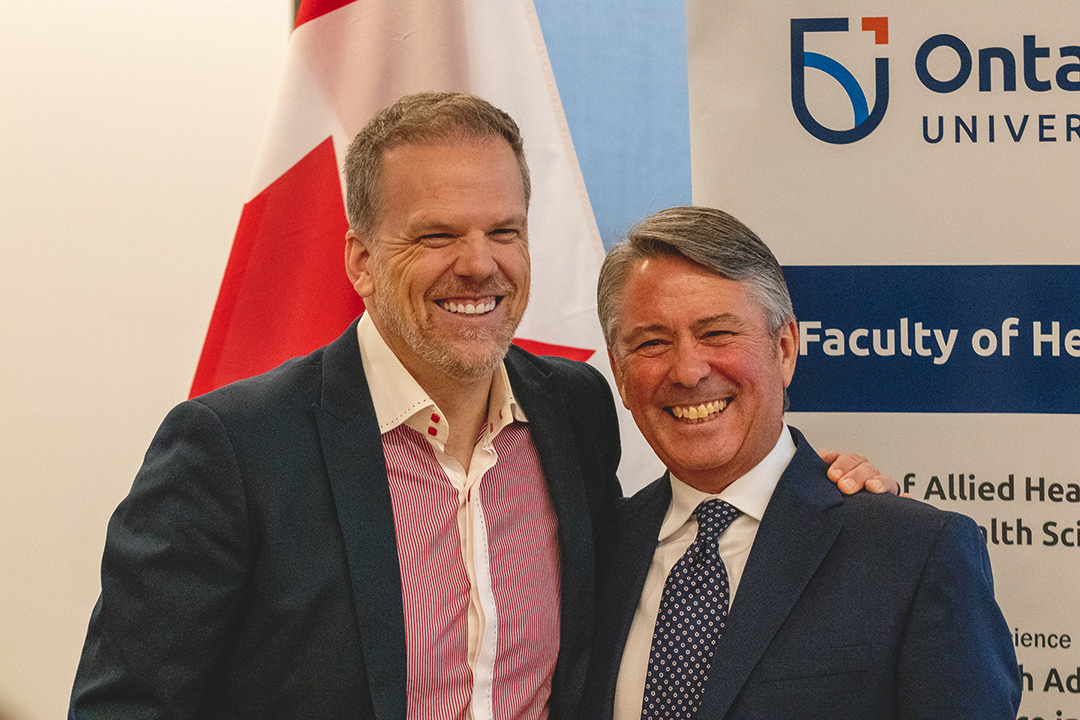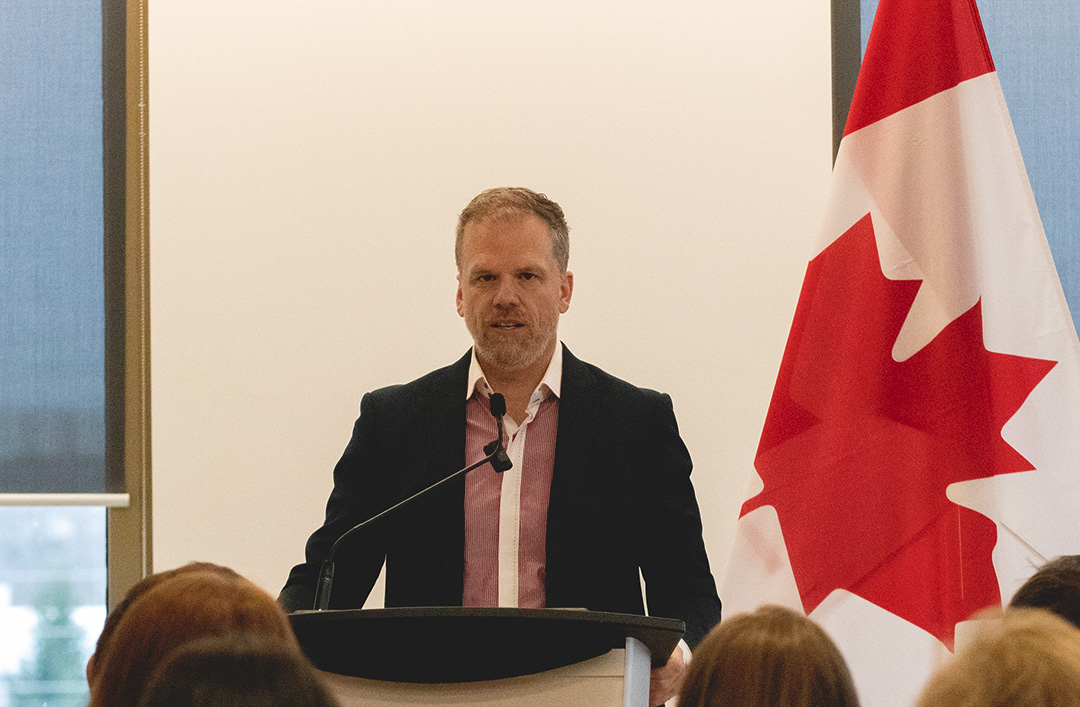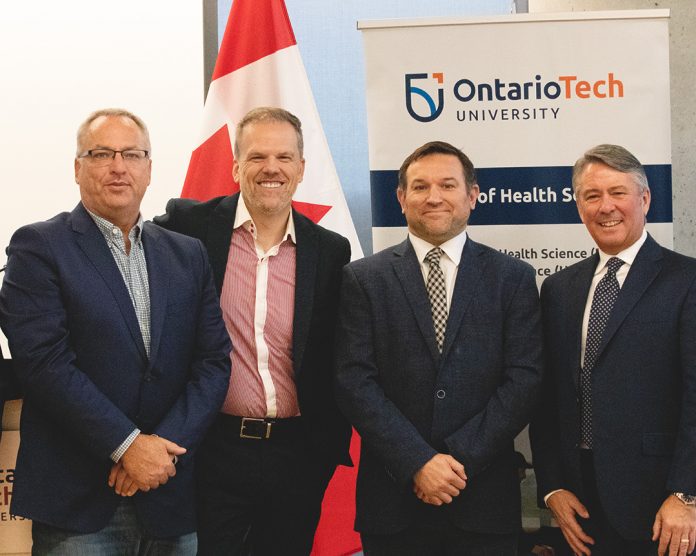By Megan Foster and Sunmeet Kour
Ontario Tech University’s rehabilitation research institute was designated the world’s first World Health Organization Collaborating Centre for musculoskeletal rehabilitation on Nov. 22. The Institute for Disability and Rehabilitation Research at Ontario Tech is now one of 10 Collaborating Centres with a focus within the broader field of rehabilitation.
Dr. Pierre Côté is the new director of the WHO Collaborating Centre. It was his team’s research that led to the creation of the centre, and he said this work is important to him because it will help improve lives.
“In many parts of the world, including remote regions in Canada, it is simply not possible to consult a physician, a physiotherapist or chiropractor if your life is impacted by musculoskeletal pain or disability,” he explained at an event celebrating the achievement.

According to Côté, there are an estimated nine million Canadians who could benefit from the type of rehabilitation his research focuses on. Addressing the need for these services for an aging population is the driving force behind Côté’s research.
His hope is to spark conversations with local health-care organizations, including Lakeridge Health, Ontario Shores and Grandview Kids, to “bring rehabilitation to the forefront of health-care discussions within the region.”
In addition, he hopes to highlight Ontario Tech as a national and global hub for this research, and to use this opportunity to work with decision-makers and governments about implementing solutions.
Many people suffer from invisible disabilities, Côté explained, noting that the stigma and silence around these conditions causes a great deal of pain and suffering. He said he’s dedicated the last 30 years to research that might help avoid or mitigate some of that pain and suffering.
At the heart of his work are people who are impacted by musculoskeletal pain.
“We’re not just researchers in the ivory tower who do their work,” he said. “We really need to work with those who are impacted by these conditions to find solutions that are suitable for them.”
Côté’s work to establish a Collaborating Centre began in 2017 after he attended a global meeting called Rehabilitation 2030, which he described as a call to action to try to bring rehabilitation into health-care systems around the world.
According to Carol Rogers, dean of the health sciences faculty, Côté was at the Institute for Disability and Rehabilitation Research since its early days as a research centre, before it was officially made into an institute. She said he spent a long time trying to get the institute established so that they could make better use of their partnerships.
“So today is truly an amazing day,” she said. “From what seems like the blink of an eye, not only did that centre become an institute, but as today clearly demonstrates, it has taken the dream to the reality and become a leader in rehabilitation research.”
In addition to putting Ontario Tech on an international radar and improving the region’s research and health-care fields, this inauguration will have impacts nationally and globally, according to Health Minister Mark Holland.

Holland explained that having an institute with such a specific focus on musculoskeletal health and rehabilitation can help lead the way to a more beneficial health-care system.
“The transformation that must occur in our health system from an illness-based system to a prevention-based system is absolutely essential,” he said. “And we absolutely have the power to do it.”
He discussed how this research could help push Canada to greater heights. In addition to economic health, he said, a country’s worth should also be measured by “the number of years that [its citizens] live in good health, free of disease and illness.”
“Canada could be the greatest country in the world in which to age,” he said.
The centre will also have an important role to play on the global stage. Dr. Antony Duttine, the technical lead for rehabilitation at the WHO, explained that Côté’s team will help to provide research and information, as well as to support other countries with their own initiatives or ventures in the field.
He said this is a relatively new area of research for the WHO. Although there are nine other Collaborating Centres that focus on some form of physical rehabilitation, this is the first in the world with a musculoskeletal focus.
“That’s really exciting because we know that more and more people are living longer, more and more of us have bone and joint issues that we need to address,” he said.
Duttine hopes this will inspire other researchers to pursue similar avenues. He plans to expand the WHO’s rehabilitation research by involving more countries and creating more centres.
“This is a journey that we’re on and I need a good network of really reliable partners to work with that can help me on that journey,” he said. “And Ontario is now one of those.”
The university’s president and vice-chancellor, Stephen Murphy, expressed that this new Collaborating Centre embodied Ontario Tech at its best.
“It’s tech with a conscience,” he said. “It’s impacting people’s lives in a tangible way.”
With the support of the WHO and the continued dedication of Côté and his team, the impact will continue to grow.
“I’m very proud for the university,” Côté said. “But more importantly, I’m very proud for people with musculoskeletal problems, because now we can really contribute to finding solutions to help them have good lives and productive lives.”




